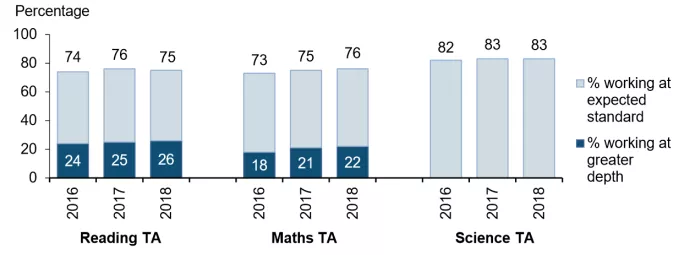Sats: KS1 reading results drop
Proportion of children passing phonics check in Year 1 rises to 82 per cent
Share
Sats: KS1 reading results drop
https://www.tes.com/magazine/archive/sats-ks1-reading-results-drop

The number of 6 and 7-year-olds reaching the expected standard in reading has dropped slightly compared to last year.
The provisional results published by the Department for Education today show that in reading, 75 per cent of Year 2 children reached the expected standard down from 76 per cent last year - although it also adds that the change in reading was less than 0.5 percentage points using unrounded data.
In maths, there were 76 per cent of children at the expected standard, compared to 75 per cent last year.
Attainment in key stage 1 teacher assessments

In writing, 70 per cent of children reached the expected standard up from 68 per cent last year, although changes in the framework this year means the judgements are not directly comparable.
And in science, results have stayed stable with 83 per cent of pupils reaching the expected standard this year and last year.
The provisional results also reveal that 82 per cent of children reached the expected standard in the phonics check which is taken at the end of Year 1. Children who don’t pass can retake the screening in Year 2 – meaning that by the end of Year 2, 92 per cent had passed.
Last year 81 per cent of pupils reached the expected standard by the end of Year 1 – and, with retakes, 92 per cent had passed by the end of Year 2.
The phonics check is a list of 40 words – 20 real words and 20 nonsense words such as “quass” – which is marked by the child’s teacher. The pass mark was 32 out of 40.
Research earlier this year criticised the phonics check as "demoralising" for pupils who are not yet reading well and said just 6 per cent of teachers felt it gave them useful information.
Wendy Scott, of the campaign group More Than a Score, said: "The phonics check is another stop on the assembly line of testing for primary school children. In this case, their potential love of reading is being sacrificed to a system obsessed with statistics and league tables.”
The reported key stage 1 results are based on teacher assessments. Around 600,000 children in Year 2 take tests in reading and maths. These test scores are not reported but are used to inform the key stage 1 teacher assessments which are reported. Despite this, there has been concern about the amount of preparation that some young children now undergo for the tests, with a Tes/NEU survey earlier this year revealing that 62 per cent of schools hold mock KS1 Sats.
The government has said it is preparing to scrap the KS1 Sats from 2023, if its plans for a baseline in reception go ahead.
Nick Gibb, speaking about today's results, said: "Reading and writing are the foundations of education and once grasped can open up a world of literature and knowledge to young people.
"Our continued focus on raising standards means six-year-olds are reading better than ever before – and we are setting an international benchmark, with Australia looking to follow our lead on phonics.
“This is a huge achievement, improving the lives and education of hundreds of thousands of children but we remain determined to make sure that not just most children, but every single child is able to meet his or her potential.”
You've reached your limit of free articles this month. Subscribe for £1 per month for three months and get: